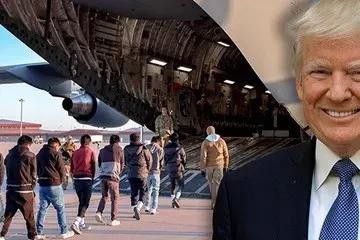The Mass Deportation of Argentines: An Uncertain Future
In recent days, the arrival of ten Argentines deported from the United States has sparked a profound debate about immigration policy and its implications for Argentine society. This event not only highlights tensions in the international context but also raises questions about the situation of immigrants and the political decisions that affect their lives. What does this deportation mean for those affected and for the country as a whole?
🌍 Current Landscape
The arrival of the deported Argentines at Ezeiza marks a milestone in the immigration policy of Donald Trump's government, which has implemented stricter measures regarding immigration. Most of the deportees entered the United States illegally and were subjected to management that has been regarded as one of the strictest in recent history. This episode highlights the dilemma of immigration in the context of globalization, where mobility faces restrictive policies that seek to control migration flows.
According to reports, the mass deportation of these Argentines is one of the first under the current U.S. administration, generating concern in the migrant community and their families in Argentina. The economic and social context in which the deportees find themselves is critical, as many lack resources and support networks upon returning to a country that, in many cases, does not offer them the same opportunities they sought abroad.
🌎 International Comparison
The phenomenon of deportation is not exclusive to the United States. Other countries, such as Germany and Spain, have faced similar challenges regarding the repatriation of immigrants. In Germany, for example, the arrival of refugees during the 2015 migration crisis generated intense debate about asylum and deportation policies. Despite the challenges, the country has opted to implement integration programs for those who manage to regularize their status, contrasting with the more punitive policies of the United States.
On the other hand, Spain has been criticized for how it handles the deportation of immigrants, especially those in irregular situations. The lack of transparent and fair processes has led to accusations of human rights violations. Such comparisons serve to understand that immigration policy is not just a matter of border control, but also of human rights and dignity.
⚖️ Social and Political Implications
Deportations have repercussions that go beyond the lives of the individuals affected. In Argentina, the arrival of these deportees could have a significant impact on public perception of immigration and human rights policy. How this issue is addressed could influence the political agenda and the social narrative surrounding immigration.
Moreover, the deportation of Argentines highlights the need to review and strengthen policies of integration and support for those returning. Many of these individuals, after years of living abroad, face a complicated return to a country with significant economic and social challenges. The lack of resources and an effective reintegration plan can lead to a new wave of migration and the perpetuation of the displacement cycle.
From a political perspective, the management of this situation could be a turning point for the Argentine government. The response to the deportation of these citizens could define the country's stance on the rights of migrants and its commitment to their protection, especially in a context where international politics tends to polarize.
✍️ Final Reflections
The recent deportation of Argentines from the United States is a reminder of the complexities and dilemmas facing migration in today's world. How this phenomenon is managed will have repercussions not only on the lives of the deported but also on Argentine society as a whole. It is imperative to foster an informed and respectful debate that considers both human rights and national security needs.
The future of these deported Argentines should not be seen as just a number in a statistic, but as an opportunity to reflect on the kind of society we want to build. Without coherent and fair immigration policies, we risk perpetuating cycles of exclusion and inequality that affect the most vulnerable communities. Argentina needs an approach that combines empathy with responsible management of migration, ensuring that human dignity is at the center of public policies.

Comments